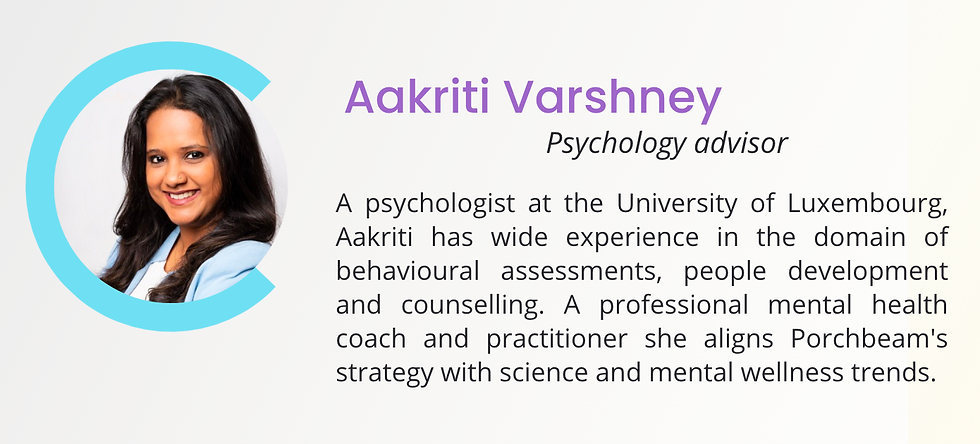6 Things You can do to Feel Better
- Tara Sandhu
- Jun 29, 2023
- 4 min read
Updated: Sep 1, 2023

We all feel low sometimes, some of us more intensely and more often than others. Just like it is important to know first aid for a physical wound, it is helpful to know what makes you feel better when you are feeling the blues and purples.
Someone may have said a harsh word, you may have missed the train to work, you may have lost your job, you may have forgotten to wear your happy socks or nothing really happened to make you feel the way you are right now, whatever it is there is something you can do to get back on track to feeling okay, even happy.
6 Things you can do to feel better
1. Call a trusted friend and be vulnerable about your feelings.

Research shows that quality conversation can improve daily well-being. When one is feeling down (low/anxious/ angry, etc) one’s thoughts can often become circular, taking one’s mind down a rabbit hole of negativity. An effective way to break this terrible cycle your mind is riding is stepping out and making a quick call to a close friend or family member. There is no shame in saying, “Hi, I need to talk to feel better.” and do just that, talk. If that friend isn’t available at that moment, set up a time to talk
soon or think of another family/ friend who can listen.
You could even call a helpline to get some support.
2. Write down your thoughts on a piece of paper or your phone.
There are moments (for eg. If you have an anxiety spell in the middle of the night) when you cannot reach out to others. Here you can try penning your thoughts - how you are feeling right now and the events that led up to it. Journaling one’s thoughts to understand and deal with them better has been a time tested technique of self comforting. Writing your feelings down activates the more logical part of your brain, and helps combat the emotional overload.
3. Do something that usually makes you feel better, preferably outdoors.
Stepping outside for a walk, a coffee to a nearby cafe, or just to get groceries works well to uplift one’s mood with a change of scenery and some happy hormones. If you are religiously inclined then visiting your place of worship or sitting down to pray wherever you are can help you regain your centre too.

Spending time in nature is scientifically proven to aid in one’s mental wellbeing - so go on and try walking barefoot on grass, sit under a tree, watch birds fly by and marvel at all of nature’s gifts and beauty.
4. Find and sign up for a group activity you enjoy.
For a lot of people feeling low is often associated with feeling lonely or disconnected from the community. This is particularly so for people living away from home for work or study.
Think of activities you enjoy doing with others like playing a sport, discussing books you love, watching movies in the theatre, going trekking in the mountains, solving puzzles, exploring new eating joints, etc. Look out for organised clubs or just a group of people in your neighbourhood who do these things - it could even be a bunch of people playing football in a park or a library club for readers. Once you find such a group, try to overcome any fears of rejection (who cares? It’s not like you know them) and ask them if you can join.
5. Help someone.
Altruistic acts i.e. doing good deeds, and helping others without looking for a reward for yourself, are actually good for your mental health. These can be one time acts like helping an elderly person carry her groceries home, knitting a sweater for a homeless person, helping a friend with a new baby clean up her home, or regular engagements like volunteering at the animal shelter, cleaning the beach, etc.
When you help someone you focus outside of yourself, which in itself reduces stress, it opens you up to feeling thankful for the things you have, it boosts your confidence by giving you a sense of accomplishment, and helps you feel more integrated with the community. One thing to be mindful of while being altruistic is to do so to the extent and in a way that isn’t burdensome for you. For example, don’t donate money unless you have a lot of savings and an assured stream of income, and if you are feeling burnt-out at work then don't volunteer for a shift at a homeless shelter. Find ways to help others frequently that fits well in your life.
6. Try guided meditation recommended for your situation.
If you have a smartphone and good network connectivity, download a mental wellness mobile application such as Being, Calm, Headspace and let them guide you through the meditation and breathing exercises suitable for your present situation. If you don’t have good network connectivity, a smartphone or a meditation coach at hand, sit down in a comfortable place for ten to thirty minutes to take slow deep breaths.
The bottom line is that if you are feeling low, think of it as something you need to solve and you'll find a way. You deserve to be happy.
* * This article has been verified by a certified psychologist.

.png)



Comments